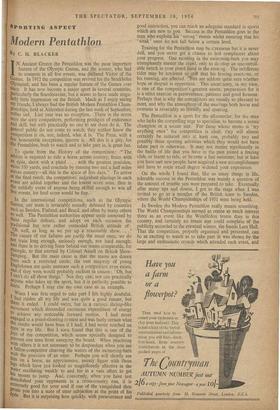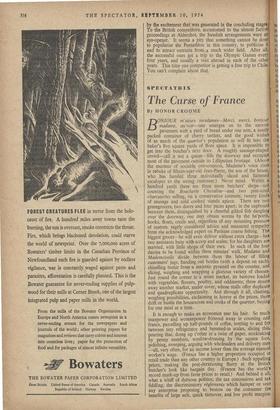Modern Pentathlon
8Y C. H. BLACKER IN Ancient Greece the Pentathlon was the most important feature of the Olympic Games, and the winner, who had to compete in all five events, was declared Victor of the Games. In 1912 the competition was revived for the Stockholm Olympiad, and has been a regular feature of the Games ever Since. It has now become a major sport in several countries, particularly the Scandinavian, but it seems to have made singu- larly little impression on the British. Much as I enjoy seeing my friends, I-always find the British Modern Pentathlon Cham- Pionships, held at Aldershot during the last week of September, rather sad. Last year was no exception. There in the arena Were the sixty competitors, performing prodigies of endurance and skill, but with practically no one to see them do it. The general public do not come to watch; they neither know the e,,ornpetition is on, nor, indeed, what it is. The Press, with a few honourable exceptions, ignores it. All this is a pity, for the Pentathlon, both to watch and to take part in, is great fun.
To quote from the History of the competition: "The athlete is required to ride a horse across country, fence with an dp6e, shoot with a pistol . . . With the greatest precision. swim 330 yards, and conclude by running two and a half miles across country—all this in the space of five days." To arrive at the final result, the competitors' individual placings in each event are added together and the lowest score wins; thus in the unlikely event of anyone being skilful enough to win all five events, his final score would be five.
In the international competitions, such as the Olympic Games, our team is invariably soundly defeated by countries such as Sweden. Finland, and Brazil, and often by many others as well. The Pentathlon authorities appear quite unmoved by these regular defeats, and adopt on each occasion the traditional but now rather outmoded British attitude of: :Ph well, as long as we put up a reasonable show. . . . ' ihe causes of our failures are partly the usual ones; we do not train long enough, seriously enough, nor hard enough; and there is no driving force behind our teams comparable, for example, to that exerted by Colonel Ansell on British Show- Jumping. But the main cause is that the teams are drawn from such a restricted circle; the vast majority of young fliglishmen are quite unaware such a competition even exists, ,and if they were would probably exclaim in unison : 'Oh, but I can't do all those things.' Nor they can; nor can practically ,anYone who takes up the sport, but it is perfectly possible to Learn. Perhaps I may cite my own case as an example.
„ When I was first urged to take part I felt highly doubtful. I had ridden all My life and was quite a good runner, but there it ended. I could swim, but in a curious shrimp-like Movement which demanded enormous expenditure of energy LO achieve any noticeable forward motion. I had never !ingaged in a pistol-shooting contest and was fairly certain what ne results would have been if I had; I had never touched an l'Pt-'e in my life. But I soon found that this is one of the JOYS of the competition, which seems specially designed to Prevent one man from sweeping the board. When practising With others it is not necessary to be despondent when you See a fellow-competitor cleaving the waters of the swimming-bath v.ith the precision of an otter. Perhaps you will shortly see Plin on a horse, an apprehensive, sweaty figure with those 'egs which have just looked so magnificently effective in the ;Vater oscillating weakly to and fro in a vain effort to get Is mount to jump. And, conversely, when you have just oemolished your opponents in a cross-country run, it is extremely good for your soul if one of the vanquished then I:rods you into a state of utter subjection at the point of his Pie. But it is surprising how quickly, with perseverance and good instruction, you can reach an adequate standard in sports which are new to you. Success in the Pentathlon goes to the man who exploits his 'strong' events whilst ensuring that his ' weak ' ones do not fall below a certain level.
Training for the Pentathlon may be s:renuous but it is never dull, and you never get a chance to feel complacent about your progress. One morning in the swimming-bath you may triumphantly master the crawl, only to develop an uncontroll- able twitch in your pistol hand in the even lig. The indifferent rider may be rendered so stiff that his fencing reactions, or his running, are affected. 'ton are seldom quite sure whether hope or despair is uppermost. This uncer.ainty, in my view, is one of the competition's greatest assets; preparation for it is a strict exercise in perseverance, patience and good humour. Perhaps that is why the competitors are usually so pleasant to meet, and why the atmosphere of the meetings both home and overseas is invariably so friendly and sporting.
The Pentathlon is a sport for the all-rounder, for the man who lacks the compelling urge to specialise, to become a tennis champion or a soccer star. For those whosz motto is 'try anything once' the competition is ideal; they will almost certainly be initiated into at least one, probably two and possibly three sporting activities which they would not have taken part in otherwise. It may not matter significantly in the battle of life that you have in the past joined a fencing club, or learnt to ride, or become a fast swimmer, but at least you have met new people. have acquired a new accomplishment and have to some small degree widened your experience.
On the whole I found that, like so many things in fife, 'tolerable success in the Pentathlon was mainly a question of the amount of trouble you were prepared to take. Eventually after many ups and downs, I got to the stage when I was invited to go as a member of the British team to Sweden, where the World Championships of 1951 were being held.
In Sweden the Modern Pentathlon really means something. The World Championships seemed to create as much interest there as an event like the Wimbledon tennis does in this country, and Certainly no tennis star could complain of the publicity accorded to the eventual winner, the Swede Lars Hall. That the competition, properly organised and presented, can be as exciting to watch as to take part in was shown by the large and enthusiastic crowds which attended each event, and by the excitement that was generated in the concluding stages. To the British competitors, accustomed to the almost furtive proceedings at Aldershot, the Swedish arrangements were an eye-opener. It seems a pity that something cannot be don() to popularise the Pentathlon in this country, to publicise it and to attract entrants from a much wider field. After all the successful ones get a trip to the Olympic Games every four years, and usually a visit abroad in each of the other years. This time one competitor is getting a free trip to Chile. You can't complain about that.



































 Previous page
Previous page